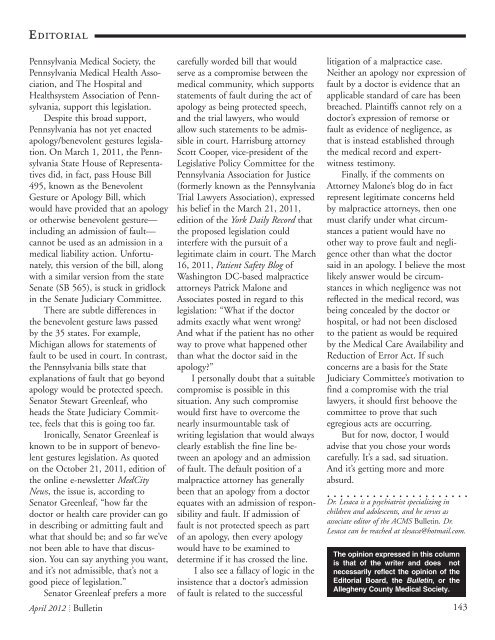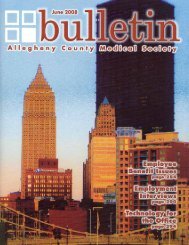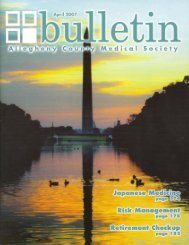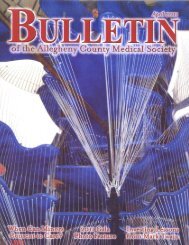Download - Allegheny County Medical Society
Download - Allegheny County Medical Society
Download - Allegheny County Medical Society
You also want an ePaper? Increase the reach of your titles
YUMPU automatically turns print PDFs into web optimized ePapers that Google loves.
EDITORIAL<br />
Pennsylvania <strong>Medical</strong> <strong>Society</strong>, the<br />
Pennsylvania <strong>Medical</strong> Health Association,<br />
and The Hospital and<br />
Healthsystem Association of Pennsylvania,<br />
support this legislation.<br />
Despite this broad support,<br />
Pennsylvania has not yet enacted<br />
apology/benevolent gestures legislation.<br />
On March 1, 2011, the Pennsylvania<br />
State House of Representatives<br />
did, in fact, pass House Bill<br />
495, known as the Benevolent<br />
Gesture or Apology Bill, which<br />
would have provided that an apology<br />
or otherwise benevolent gesture—<br />
including an admission of fault—<br />
cannot be used as an admission in a<br />
medical liability action. Unfortunately,<br />
this version of the bill, along<br />
with a similar version from the state<br />
Senate (SB 565), is stuck in gridlock<br />
in the Senate Judiciary Committee.<br />
There are subtle differences in<br />
the benevolent gesture laws passed<br />
by the 35 states. For example,<br />
Michigan allows for statements of<br />
fault to be used in court. In contrast,<br />
the Pennsylvania bills state that<br />
explanations of fault that go beyond<br />
apology would be protected speech.<br />
Senator Stewart Greenleaf, who<br />
heads the State Judiciary Committee,<br />
feels that this is going too far.<br />
Ironically, Senator Greenleaf is<br />
known to be in support of benevolent<br />
gestures legislation. As quoted<br />
on the October 21, 2011, edition of<br />
the online e-newsletter MedCity<br />
News, the issue is, according to<br />
Senator Greenleaf, “how far the<br />
doctor or health care provider can go<br />
in describing or admitting fault and<br />
what that should be; and so far we’ve<br />
not been able to have that discussion.<br />
You can say anything you want,<br />
and it’s not admissible, that’s not a<br />
good piece of legislation.”<br />
Senator Greenleaf prefers a more<br />
April 2012 : Bulletin<br />
carefully worded bill that would<br />
serve as a compromise between the<br />
medical community, which supports<br />
statements of fault during the act of<br />
apology as being protected speech,<br />
and the trial lawyers, who would<br />
allow such statements to be admissible<br />
in court. Harrisburg attorney<br />
Scott Cooper, vice-president of the<br />
Legislative Policy Committee for the<br />
Pennsylvania Association for Justice<br />
(formerly known as the Pennsylvania<br />
Trial Lawyers Association), expressed<br />
his belief in the March 21, 2011,<br />
edition of the York Daily Record that<br />
the proposed legislation could<br />
interfere with the pursuit of a<br />
legitimate claim in court. The March<br />
16, 2011, Patient Safety Blog of<br />
Washington DC-based malpractice<br />
attorneys Patrick Malone and<br />
Associates posted in regard to this<br />
legislation: “What if the doctor<br />
admits exactly what went wrong?<br />
And what if the patient has no other<br />
way to prove what happened other<br />
than what the doctor said in the<br />
apology?”<br />
I personally doubt that a suitable<br />
compromise is possible in this<br />
situation. Any such compromise<br />
would first have to overcome the<br />
nearly insurmountable task of<br />
writing legislation that would always<br />
clearly establish the fine line between<br />
an apology and an admission<br />
of fault. The default position of a<br />
malpractice attorney has generally<br />
been that an apology from a doctor<br />
equates with an admission of responsibility<br />
and fault. If admission of<br />
fault is not protected speech as part<br />
of an apology, then every apology<br />
would have to be examined to<br />
determine if it has crossed the line.<br />
I also see a fallacy of logic in the<br />
insistence that a doctor’s admission<br />
of fault is related to the successful<br />
litigation of a malpractice case.<br />
Neither an apology nor expression of<br />
fault by a doctor is evidence that an<br />
applicable standard of care has been<br />
breached. Plaintiffs cannot rely on a<br />
doctor’s expression of remorse or<br />
fault as evidence of negligence, as<br />
that is instead established through<br />
the medical record and expertwitness<br />
testimony.<br />
Finally, if the comments on<br />
Attorney Malone’s blog do in fact<br />
represent legitimate concerns held<br />
by malpractice attorneys, then one<br />
must clarify under what circumstances<br />
a patient would have no<br />
other way to prove fault and negligence<br />
other than what the doctor<br />
said in an apology. I believe the most<br />
likely answer would be circumstances<br />
in which negligence was not<br />
reflected in the medical record, was<br />
being concealed by the doctor or<br />
hospital, or had not been disclosed<br />
to the patient as would be required<br />
by the <strong>Medical</strong> Care Availability and<br />
Reduction of Error Act. If such<br />
concerns are a basis for the State<br />
Judiciary Committee’s motivation to<br />
find a compromise with the trial<br />
lawyers, it should first behoove the<br />
committee to prove that such<br />
egregious acts are occurring.<br />
But for now, doctor, I would<br />
advise that you chose your words<br />
carefully. It’s a sad, sad situation.<br />
And it’s getting more and more<br />
absurd.<br />
○ ○ ○ ○ ○ ○ ○ ○ ○ ○ ○ ○ ○ ○ ○ ○ ○ ○ ○ ○ ○<br />
○<br />
Dr. Lesaca is a psychiatrist specializing in<br />
children and adolescents, and he serves as<br />
associate editor of the ACMS Bulletin. Dr.<br />
Lesaca can be reached at tlesaca@hotmail.com.<br />
The opinion expressed in this column<br />
is that of the writer and does not<br />
necessarily reflect the opinion of the<br />
Editorial Board, the Bulletin, or the<br />
<strong>Allegheny</strong> <strong>County</strong> <strong>Medical</strong> <strong>Society</strong>.<br />
143
















